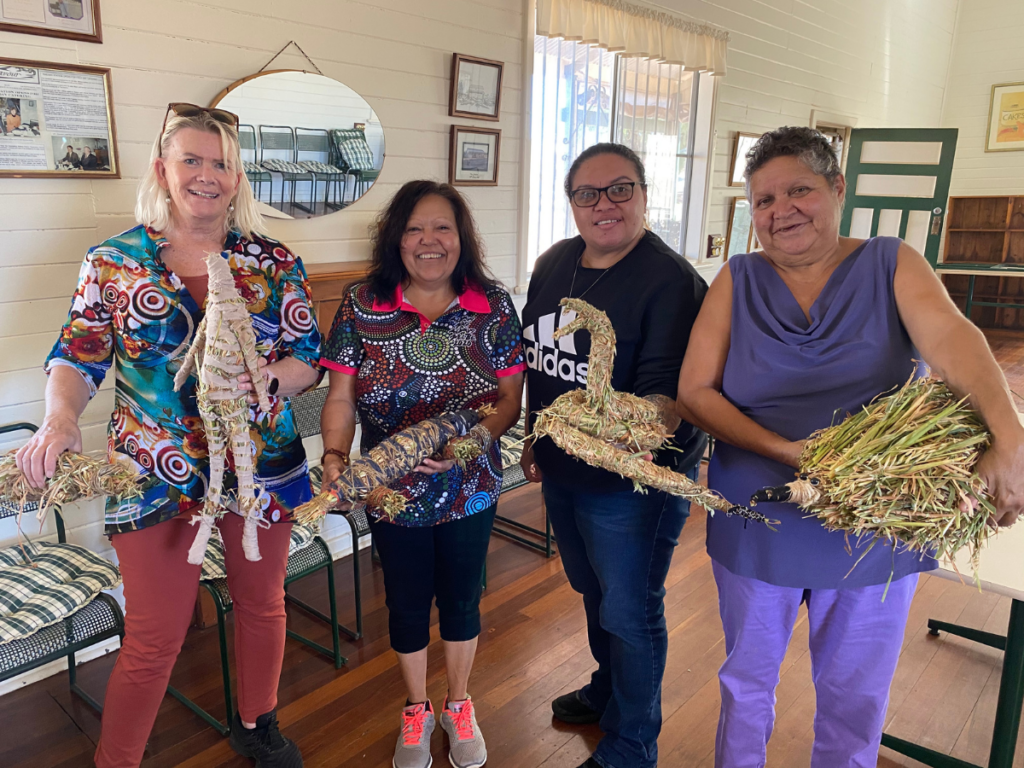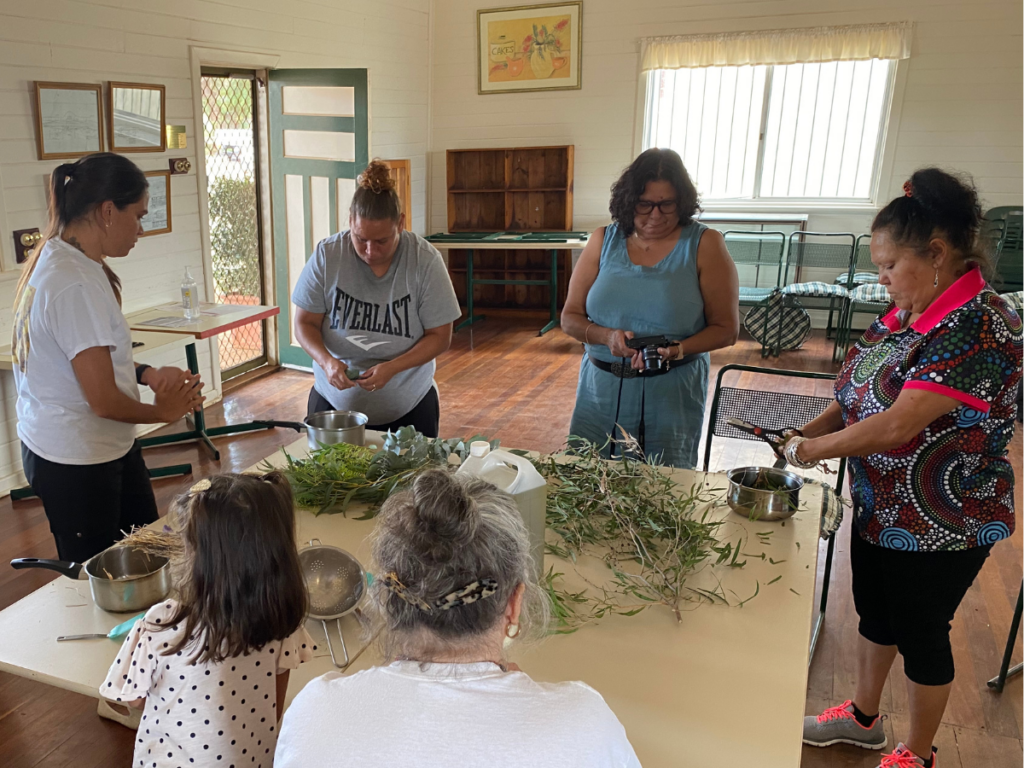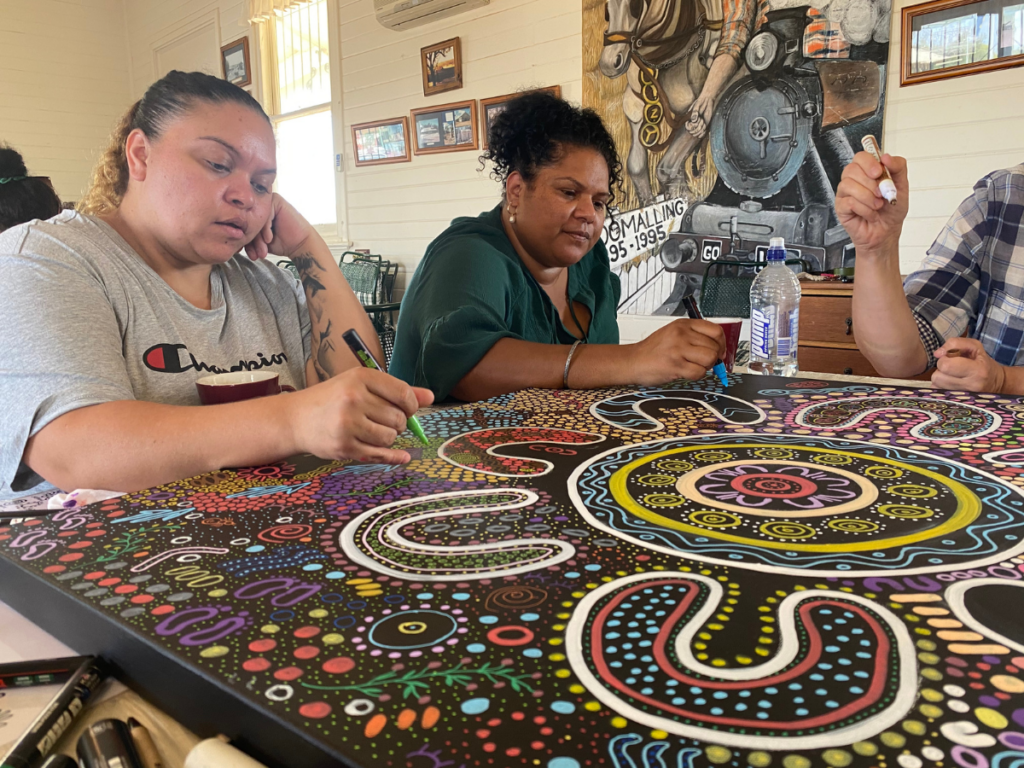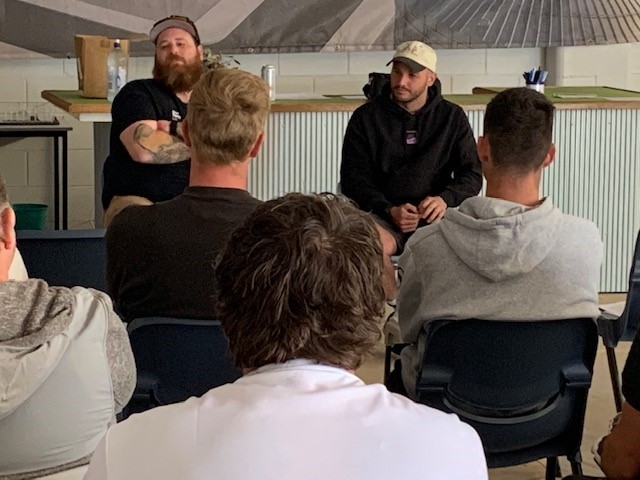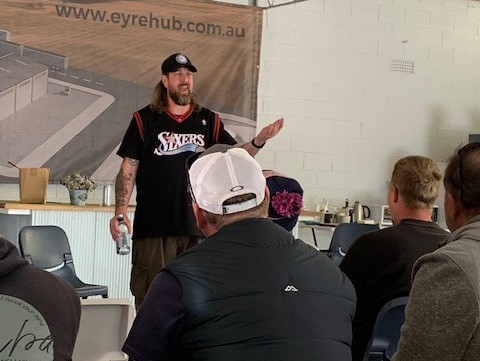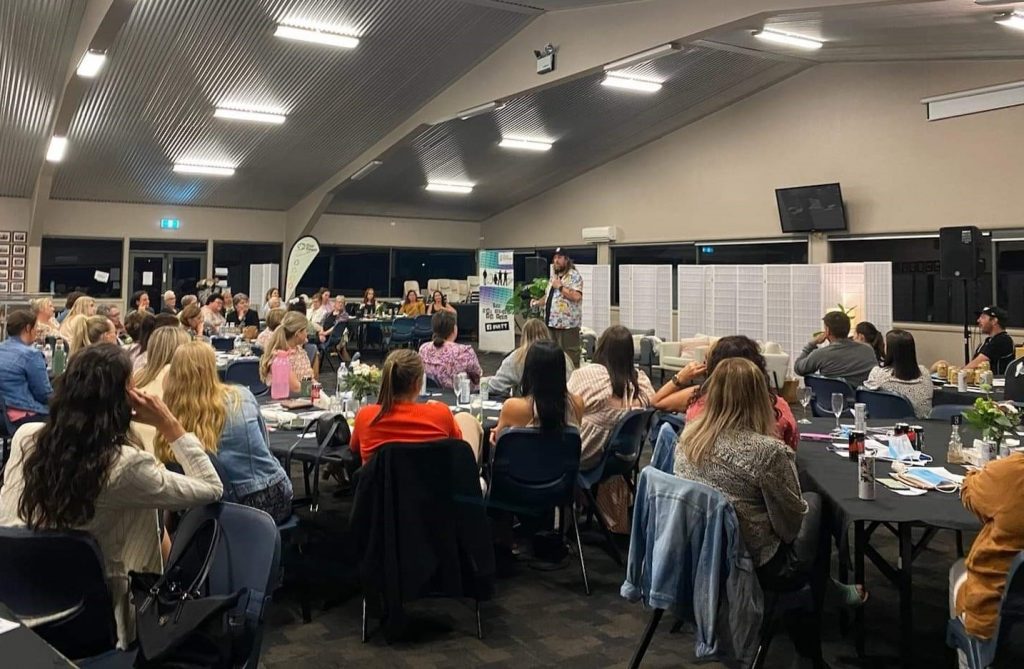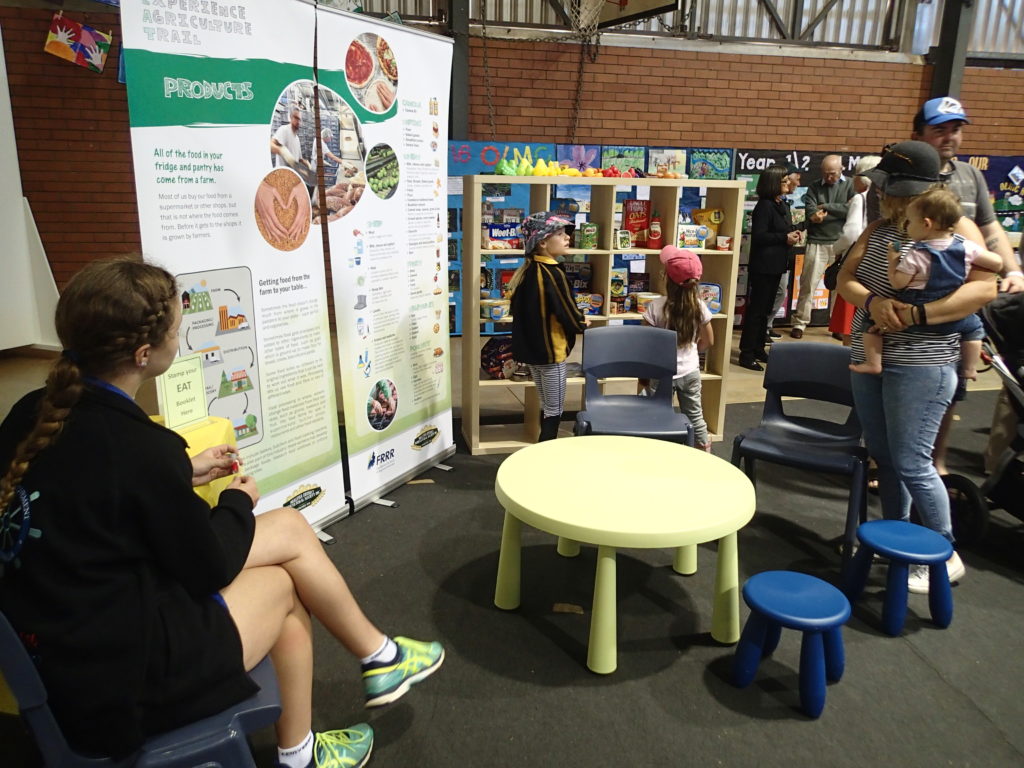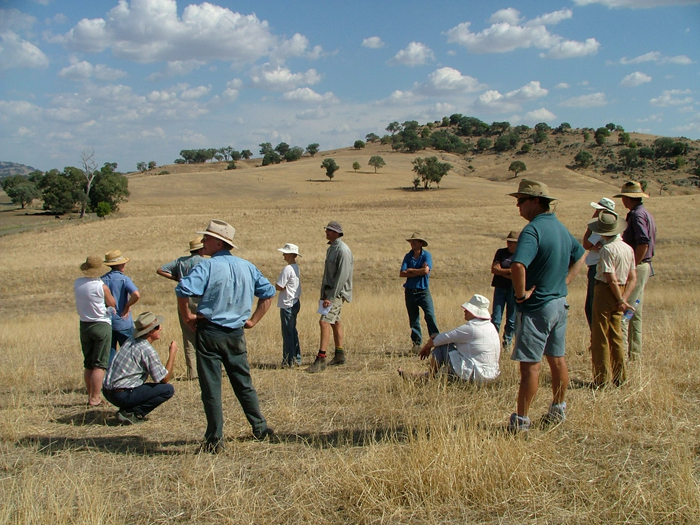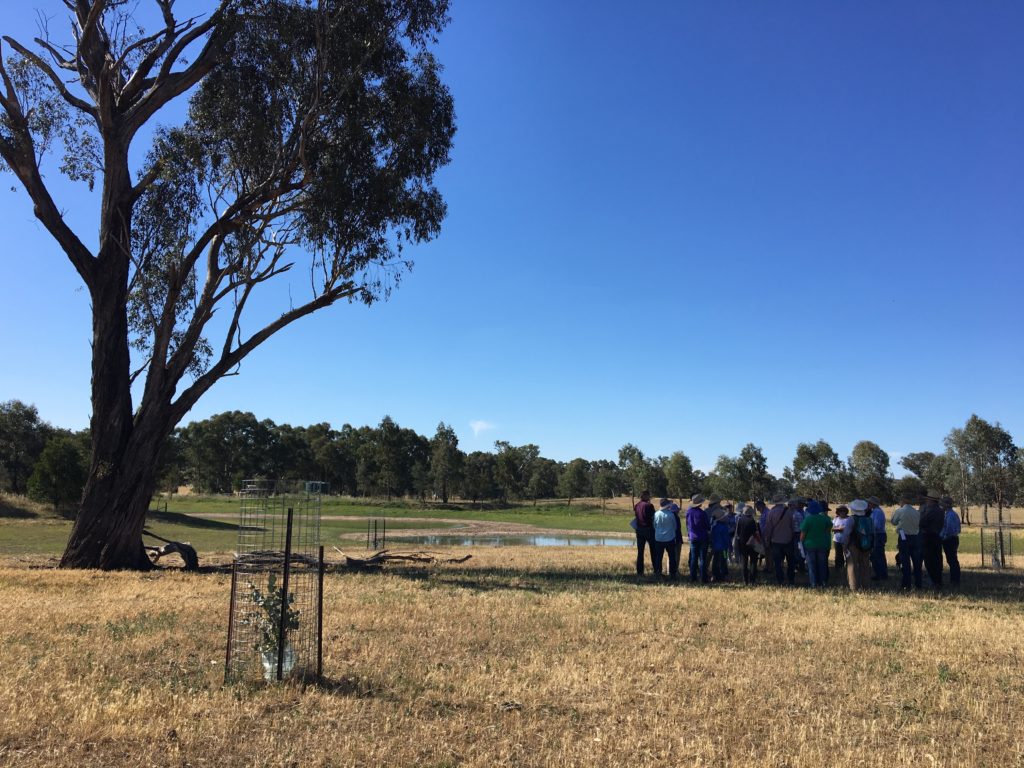Foundation for Rural & Regional Renewal (FRRR)
Workshops for women
Goomalling Aboriginal Corporation in the Wheatbelt region of Western Australia, used their $19,605 In a Good Place grant, funded by CCI Giving for their project called Maangart Yorga (Jam Tree Woman) – a workshop series delivered over the course of a year to impart both traditional and life skills to Aboriginal women and girls.
The program was created for Aboriginal women experiencing poverty, isolation, domestic violence and mental health concerns, and Aboriginal girls, from twelve years old, who are at risk. The program aimed to increase social participation by providing relevant and culturally appropriate workshops and a culturally safe space for connectedness. The workshops enabled the re-emergence of yarning circles and connection to Country that has helped foster relationships with young Aboriginal girls and Elders and provide an ongoing support network.
Maangart Yorga was an initiative to provide a safe space for women and girls to come together, learn, share and connect. Delivered through a series of workshops over a year, the aim was to increase participation in social activity, enhance the sense of community connectedness, improve outlook and help participants make healthier choices.
The workshops included a wide variety of traditional art, yoga and meditation, and health and wellbeing presentations. A series of practical skills sessions and workshops were held for women to have greater confidence, such as:
The organisation reported that participants would come to the workshop filled with apathy, tiredness or stressed, but always left feeling fulfilled and empowered after each workshop. The workshops provided a set of skills that can be transferred amongst the community.
While the workshop roll-out was interrupted by maternity leave for the program manager, the silver lining was that her leave coincided with movement restrictions due to COVID, so there was no additional impact from the pandemic.
Sadly, participation rates were lower than expected due to deaths in the community of two female elders and the suicide of two young Aboriginal men. Grieving periods were long and resulted in non-attendance from some members. For some members, the Maangart Yorga was a saving grace and gave them something positive to focus on.
Overall, 16 women participated across the program (including 2 non-Indigenous ladies), with a good cross section of ages from 21 years to 61 years old. Four female Aboriginal facilitators, three local female non-Indigenous facilitators, and two local female-owned food businesses also benefited from the project.
The greatest success of the program was providing a consistent and safe space for women to meet and yarn about their experience, which assisted healing and created lasting connections. The group plans to continue to meet monthly to use some of the skills they’ve learned and to continue connecting with each other. The Council is working with the Goomalling Aboriginal Corporation to create a permanent space for the women to take ownership of so they can create and share culture.
The close knit community of Quorn has been impacted by closure of local industrial businesses, prolonged drought, changes to lifestyle and isolation due to COVID-19, and recent deaths of long term residents. Service provider changes and short staffing had reduced available local support services. Things were seeming pretty bleak, so the town decided it was time to do something about it.
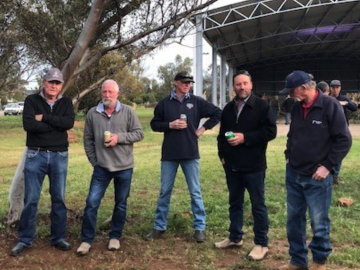
The Quorn Community Sporting Association requested funds to provide two free community events – one for the fellas and one for the ladies – providing an opportunity to come together, have a catered meal and listen to Stephanie Schmidt from ACT for Ag on building skills in psychological flexibility, gain some skills to help manage in times of stress, and take home some resources. While COVID-19 interrupted the original schedule, the events finally took place.
The Men’s Night Out was held on a Friday night at the new Quorn Pioneer Machinery Pavilion. The attendance of 93 men aged 10-96 exceeded expectation. All were able to enjoy the BBQ catering provided. The presentation was tailored for the men with plenty of opportunities for questions and conversation. A group of young Aboriginal men from the APY lands attended. They mentioned that they chose to come to the event as there weren’t any other events in the region. They engaged in the conversations and the presentation. Afterwards, Elders gave the following feedback:
‘The fellas had a great night thank you. We really need more of these nights for the area. We are also finding the lack of culturally appropriate services around and hope to network more with you all. We would love to do more and we can maybe host onsite where we are in the future.’
The next day, the Ladies High Tea took place at the Quorn Town Hall and was attended by 100 local women, including the local catering team. The hall was abuzz with conversation, whist cakes, sandwiches, tea and coffee were served in the good china! The ladies enjoyed their own tailored presentation from Stephanie which generated lots of questions and discussion.
Every participant at both events received an Act for Ag Toolkit which included an Act for Ag Handbook, Noticing Map notepad, Shared Purpose notepad, Values Cards and online resources to help build psychological flexibility and wellness.
Organisers received resounding positive feedback after both the events, with the community indicating they are very keen for more. The common theme from the feedback received was that the community valued was being connected with others in their community and looking out for each other.
The community group I’m Not Afraid To Talk (INATT) partnered with the University of South Australia (UniSA) to deliver a mental wellbeing program through Greater Flinders and Eastern Eyre football leagues / clubs to help adolescent and adult men in rural communities to improve their mental health and reduce the risk of suicide.
Working around COVID restrictions, cancellation of the football season, harvesting and extreme weather events, workshops were held in Kimba, Tumby Bay and Cowell, with a joint follow up session via Zoom. The workshops were supported by a $19,900 In a Good Place grant that was funded by CCI Giving.
Each four-hour workshop featured local key speakers sharing their lived experienced, followed by a series of activities that focused on how men may be perceived by others and how they perceive themselves, share experiences, and the importance of ongoing open conversations about mental health. A Toolkit Resource was collaboratively developed by UniSA and INATT after the workshops to guide clubs in planning activities to promote mental wellbeing.
The steps and strategies listed in the resource are based on community development principles and give clubs ideas on how to get started with planning mental wellbeing activities. This was introduced during the follow up session and made available to each group.
Due to the changes to the program, there was an underspend of funds. With the permission of FRRR, INATT ran an additional workshop for women in Kimba. This was a great success with approximately 80 women attending from Kimba and surrounding communities.
The workshops were the greatest success of this project as was evident by the high praise received by participants. The workshops assisted in improving attitudes towards mental health and help seeking. Participants also reported an increase in confidence and comfort in discussing mental health. Some of the comments included:
- “Mental health discussion rarely starts without a major poke”.
- “Probably will never be comfortable to do this but more equipped to have a go”.
- “Eye opening and is going to help myself and community”.
- “Very well done to get tough blokes thinking and talking”.
- “We don’t have many supports, apart from each other at the moment”.
- “Reassuring to know you not alone, great advice on how to deal with mental health”.
- “Was a great night, confronting at times but that made it so worthwhile and a good laugh at the end”.
The achievements of this project have been numerous with the strengths of both collaborators on this grant put to best use. INATT has extremely strong links with the Greater Flinders and Eastern Eyre communities which was evident by their excellent leadership and facilitation of the workshops and the level of attendance.
We begin by acknowledging the wisdom of the Larrakiah, Warrai, Kungarakany and Yolngu elders past, present and emerging, where this project took place, and recognise all dance in Australia sits within the context of 65,000 years of Aboriginal and Torres Strait Islander dance continuum.
“We have lived the past, we are too old to live in the future, what we have is in the now”
Daryl Butler, Grey Panthers member.
Tracks Dance Company in Darwin and Miku Performing Arts in Yirrkala on the Gove Peninsular are providing artistic leaders for the Grey Panthers dancers’ three-year Dhiyala Walu – In the Now project. The project shines a light on older adult dance and creativity and is providing tangible outcomes of learning and knowledge sharing, as well as skills development in performance and film.
With the support of a $25,000 Strengthening Rural Communities (SRC) grant, Tracks Inc received funding to rollout the foundation year of activities focused on community connectivity, group cohesion, engagement and social wellbeing of older adults in three regional, rural and very remote communities in the Northern Territory.
In providing 65 weekly dance workshops throughout 2021-2022, the project connected older adult from Darwin, Coomalie (Batchelor) and Yirrkala, who were located more than 1000km apart, to celebrate Aboriginal culture.
‘The feeling of connectivity was palpable when we got the Grey Panthers in the same room as Janet Munyarryun, Rachael Wallis and Banula Marika. We are most proud of the direct sharing of culture (two ways).”
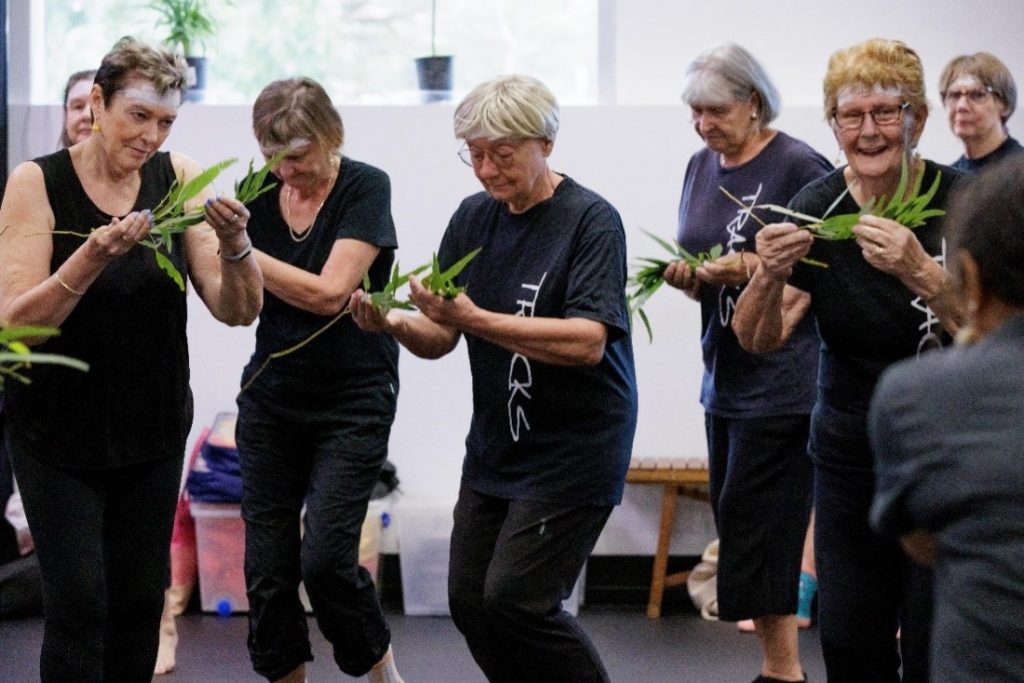
“Some Grey Panthers were hesitant to have ochre on them. Janet explained it was a sign of respect as sadly Banula had just lost his mother. Understanding this, all the Grey Panthers lined up to be painted, they also danced with the peppermint leaves collected the previous day.”
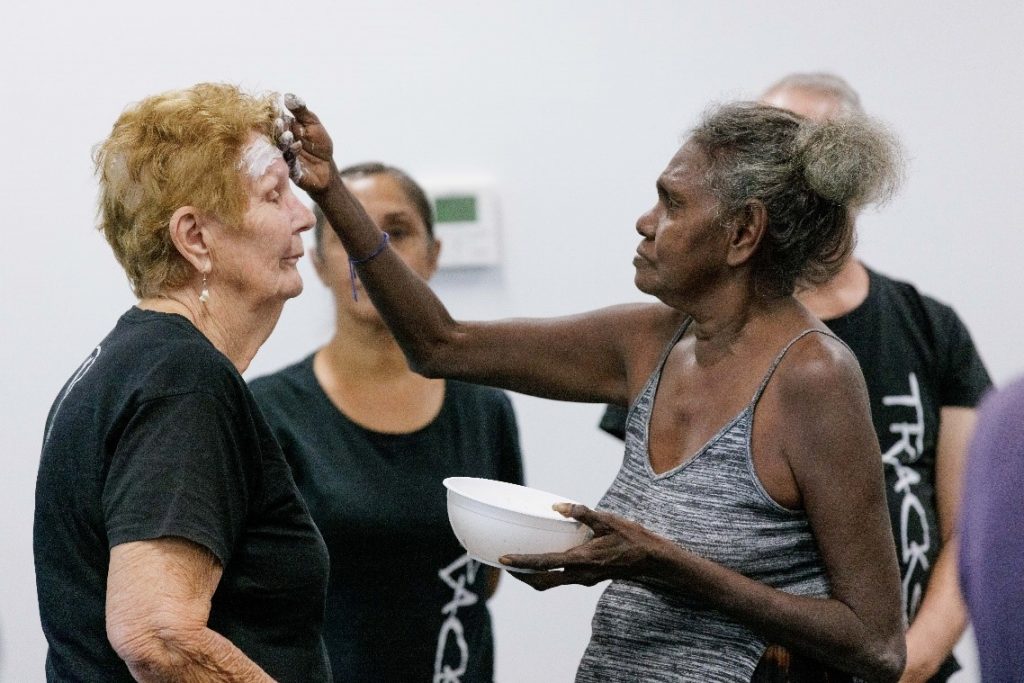
Although dance workshops were unable to be held in Yirrakala as planned due to COVID-19, two senior elders from Nhulunbuy joined the project and participated in face-to-face workshops in Coomalie and Darwin to shared choreography and cultural knowledge.
In recognising the importance of Aboriginal cultural intellectual property rights, Rachael Wallis from Miku Performing Arts worked closely the senior elders Janet Munyarryun and Song Man Banula Marika to get permissions, recording music for the Gapu and Morning Star dances and learn movements, and ensuring only culturally appropriate material was shared through the project.
“At Tracks we would frame this as a ‘A Slow Burn Project’ where relationships are a focus and getting things culturally right is a priority. This is fundamental for projects with First Nations people living in remote and isolated communities.”
The Grey Panthers dance troupe perform about six times a year at various public events and festivals, bring joy to audiences and dancers alike, reshaping a narrative in the everyone’s mind about what “old people” can and can’t do.
“I have lived in the Territory since 1986. I am 72 years old and a newbie to the Panthers. I was simply blown away to be taught the Yirrkala Aboriginal women’s Morning Star dance and another water dance. [For you to] come and inspire 60+ older white women with your generosity of spirit gives me such hope for reconciliation”.
Sally Gearin, Grey Panther member.
Dhangu Walu has since been the catalyst for the development of a future project with Miku Performing Arts, as Janet Munyarryun and Banula Marika want to share the cultural story of the Sugarbag Man. This is an achievement as enough trust was built during Dhangu Walu for elders to come forward and want to work with Tracks to share a story. Consequently, Tracks Inc successful securing a $50,000 SRC Rebuilding Regional Communities grant in late 2022 to deliver the Sugarbag Man project in 2023. Keep an eye out for more to come on this new project.
The Foundation for Rural & Regional Renewal (FRRR) will host two free capacity building workshops for volunteers, Board members and paid staff members of community groups and not-for-profits in Taree and Wingham, as part of the Investing in Not-for-Profit Capacity in Regional NSW (INFPC) program.
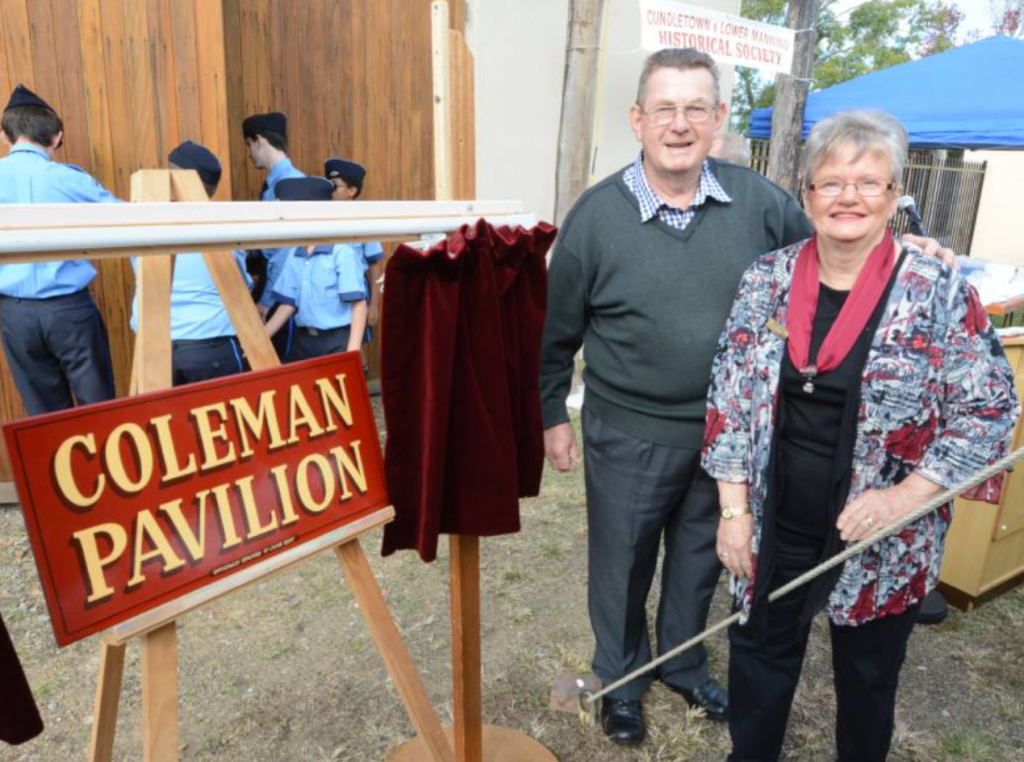
The program, which is funded by Paul Ramsay Foundation, aims to enhance the capacity of local grassroots not-for-profit organisations, helping them to respond and thrive in the face of current challenges, including recovery from the fires, floods and impacts of COVID.
These workshops have been specifically created based on input from community groups at workshops last year. The two sessions will focus on building the confidence and capacity of community group Board’s, exploring practical solutions for success and sustainability and engaging strategies for recruitment, retention and management of volunteers.
| Workshop 1: Governance Skills: Build your Board’s confidence & capacity Date: Tuesday 29 November 2022 Time: 9:00 am – 4:00 pm (catering included) Venue: The Auditorium, Club Taree, 121 Wingham Road, Taree Register: https://bit.ly/3FpMy3Q | Workshop 2: Engaging & Sustaining Volunteers: Recruitment, retention & management strategies Date: Wednesday 30 November 2022 Time: 9:00 am – 1:00 pm (catering included) Venue: The Auditorium, Club Taree, 121 Wingham Road, Taree Register: https://bit.ly/3DEnAfG |
The sessions are free but places are limited, so attendees are encouraged to register now. These highly interactive workshops will be facilitated by Nicole Weber, who has 25 years’ experience as a manager of teams, in mostly Human Services organisations in the public, private and not-for-profit sector.
For queries about the workshops, email info@frrr.org.au or call 1800 170 020
Investing in Not-for-Profit Capacity in Regional NSW is an 18 month place-based program running in three bushfire affected communities, being Bega, Taree and Wingham, and Glen Innes. For more information visit https://frrr.org.au/investing-in-not-for-profit-capacity-nsw/.
In December 2021, FRRR awarded five grants totalling $150,152 to a range of community groups in Taree and Wingham. Projects responded to many of the issues raised during previous workshop sessions, including strategic and operational planning, marketing, revenue strategy and digital solutions to support volunteers and not-for-profit organisations.
Two free capacity building workshops for people volunteering or working in Bega Valley’s not-for-profit and community sector are now available, thanks to FRRR’s Investing in Not-for-Profit Capacity in Regional NSW program.
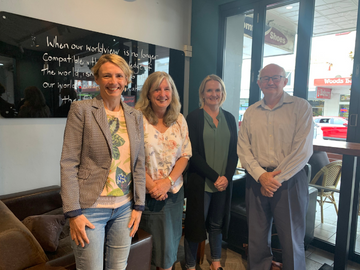
The Program, a partnership between the Foundation for Rural & Regional Renewal (FRRR) and the Paul Ramsay Foundation, aims to support the resourcing and capacity of grassroot not-for-profits, helping them to respond and thrive in the face of current challenges. It offers a program of activities including local workshops, skill development and networking to help create local solutions to local issues. Grants were also awarded through the program in 2021.
FRRR’s Philanthropic Services Manager, Jo Kemp, said the workshops aim to add value beyond grants awarded last year.
“Over the last nine months, we have been talking with and listening to the Bega Valley community. These workshops will explore the themes of growing a flourishing volunteer community and will also help local organisations to develop strategies for responding to community needs across Bega Valley. The sessions have been designed around the suggestions that have been raised during our conversations with community members and have been received with enthusiasm by local leaders.
“During a workshop held last year we were excited to hear about the interest among local groups to find ways to collaborate and develop a shared vision to best respond to community priorities across the Valley. We hope that these workshops will help to build on those ideas,” said Ms Kemp.
| Topic: Engaging and Sustaining Volunteers Date: Tuesday 17 May 2022 Time: 9.30am – 1.00pm Venue: Gulaga Room, Bega Valley Commemorative Civic Centre REGISTER: https://bit.ly/volunteer_bega | Topic: Collaboration & Strategy Development Date: Wednesday 25 May 2022 Time: 9.30am – 4.00pm Venue: Biamanga Room, Bega Valley Commemorative Civic Centre REGISTER: https://bit.ly/collaboration_bega |
The sessions are free and numbers are limited.
In 2021 the Bega Valley Shire Business Forum received a $60,000 grant to strengthen the resourcing of the seven members Chambers of Commerce in the Bega Valley. Nigel Ayling, President Merimbula Chamber of Commerce, said that the funds made a huge difference.
“The funds received from FRRR for a Coordinator and Grant Writer have been invaluable in supporting our Chambers and sourcing extra funds. The workshop exploring strategies for volunteer engagement will definitely be of interest to our members and I look forward to attending. We really appreciate the support from FRRR and look forward to working with them again in the future,” he said.
Investing in Not-for-Profit Capacity in Regional NSW is an 18 month place-based program running in three bushfire affected communities, being Bega, Taree and Wingham, and Glen Innes. For more information visit https://frrr.org.au/investing-in-not-for-profit-capacity-nsw/.
For queries about the workshops, email info@frrr.org.au or call 1800 170 020.
West Coast Connect (WCC) was established in 2013 to support social and economic development around Queenstown and the west coast of Tasmania. With a staff of four, a committee of five, and 25 volunteers, WCC aims to provide supportive core services that encourage a shared, communal impact to socio-economic issues within the community and the region.
Growing training opportunities
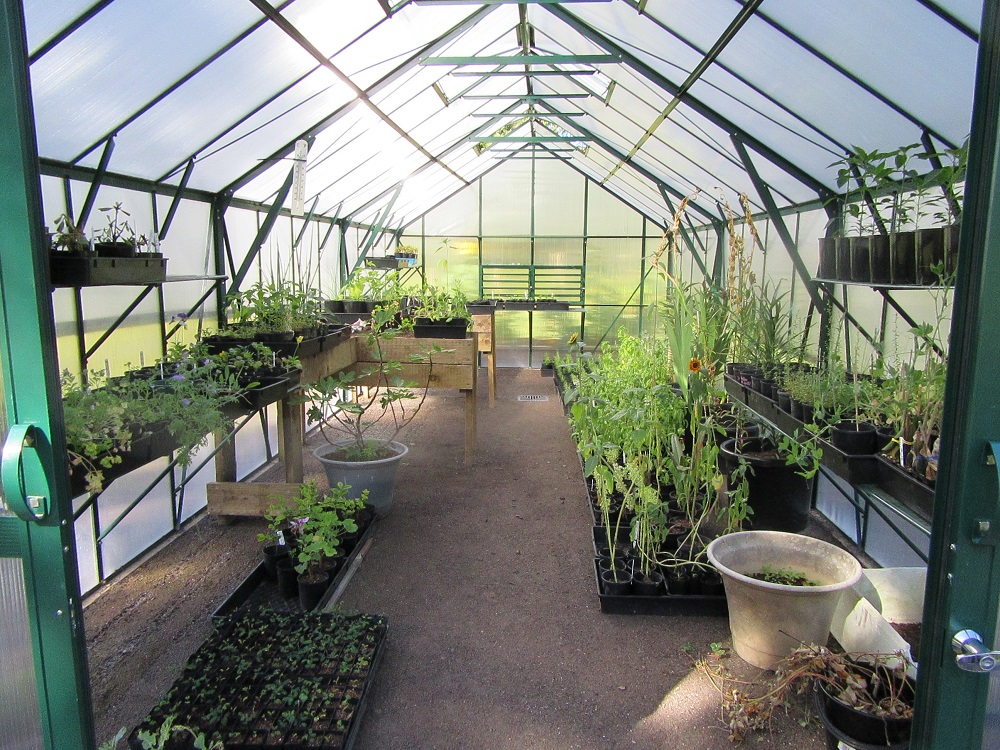
With the West Coast of Tasmania losing their TAFE Tasmania Campus over 10 years ago, community members only had access to training organisations that are located a minimum of 200km away.
To address skill shortages and provide job opportunities, WCC decided to offer vocational training in horticulture, conservation, land management and landscaping. They devised a plan for a new training facility to offer short courses and vocational training in conjunction with TasTAFE – BUT first they needed to equip the training grounds with essential infrastructure.
On the ground training aims to raise local employment
WCC secured a Strengthening Rural Communities grant of $9,200 to purchase a greenhouse, garden beds and planter boxes that were accessble by people with mobility issues. This equipment was manufactured by Qnique Products, a Social Enterprise that engages in vocational carpentry and joinery training for unemployed residents and residents with disabilities.
The horticultural facilities serve as a practical learning area, both as a hands-on training ground for vocational training in horticulture, landscaping and conservation and land management, and for the wider community, as an area for exploring and learning about growing organic foods, growing herbs, establishing and maintaining a cottage garden or growing fruit trees in a harsh climate.
Having the greenhouse also meant WCC could commence the Training and Work Pathway Program – for long-term unemployed jobseekers. Participants were involved in the initial establishment of the center, from building the access path to putting in place the raised garden beds and building in ground ones.
“Community interest in the centre was great from the beginning. Community short courses run at the centre were very popular and received great feedback. Enquiries about further courses are constant.”
Unexpected value for the community at large
Additionally, the Centre proved to be of great value to the community after the Queenstown community garden was forced to close in August 2020. WCC now sees a need to further develop the centre for greater access to the community at large and wants to establish mini-greenhouses and garden beds for local residents with an interest in gardening but no opportunity to do so at their home.
“West Coast Connect wishes to express our thanks for the grant money. Without this funding, the establishment of the horticultural training and discovery centre would not have gone ahead due to financial restraints.”
Workshops for community-based not-for-profits in Batemans Bay area
FRRR is inviting not-for-profit organisations (NFPs) in the Batemans Bay region to take part in an upcoming series of two workshops to plan how the Foundation’s Investing in Rural Community Futures (IRCF) program can support them to create stronger organisations for a stronger community.
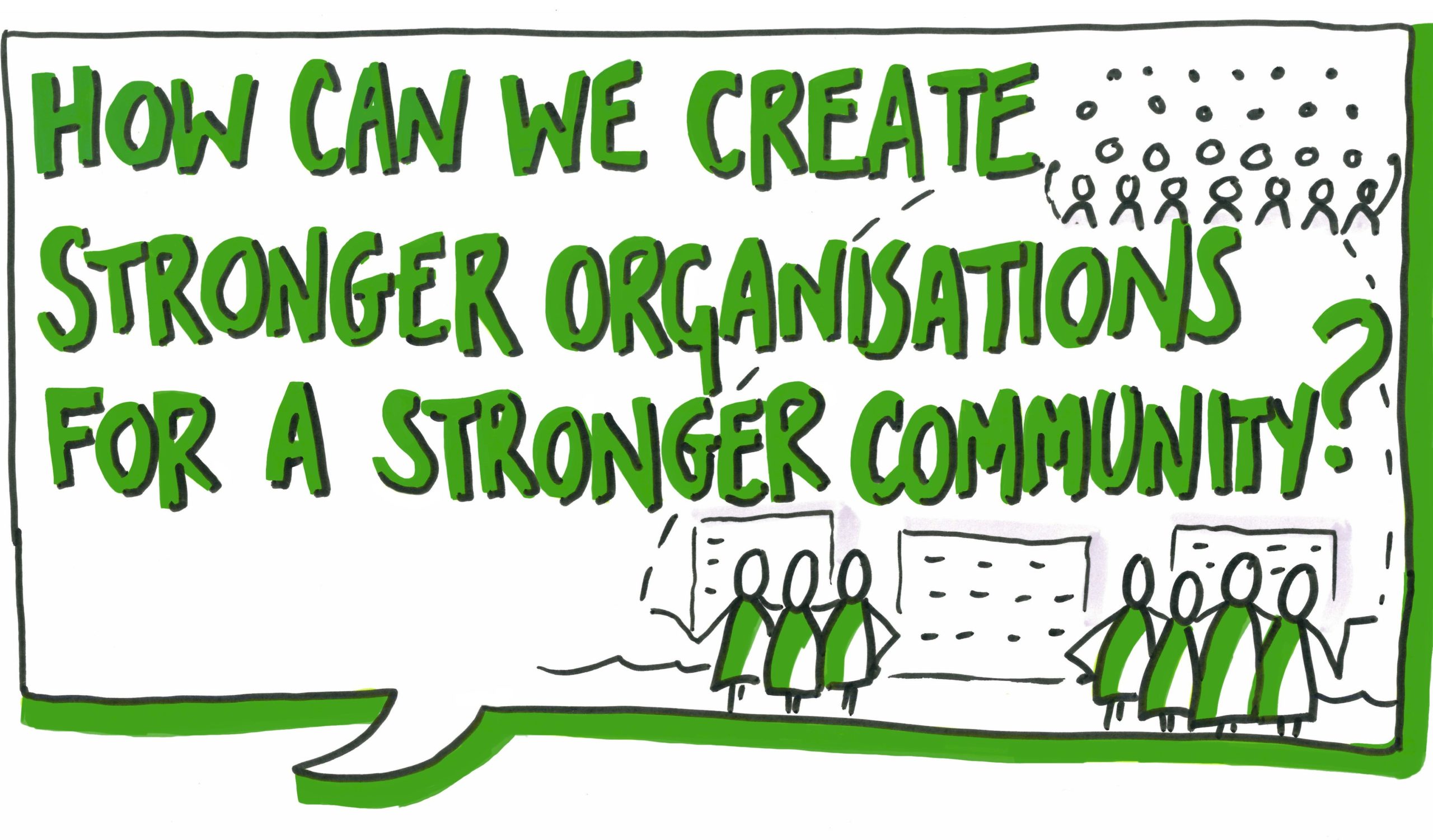
FRRR’s IRCF program is run in partnership with The Snow Foundation. Now in its second year, the five-year program is designed to strengthen local NFPs in the Shoalhaven through localised support, resources and funding so they can make lasting impacts in the community.
Called “Community Roadmap” (CR) workshops, these two sessions will together develop the community roadmap allow NFPs in the Batemans Bay region to come together and map out how they will leverage the funding and support of the IRCF program over the next four years to maximise opportunities for long-term sustainability.
Kate Dezarnaulds, FRRR’s IRCF Program Coordinator, said that the workshops will look to the future, helping Batemans Bay NFPs uncover shared goals and challenges, as well as offering a safe space for participants to reflect on and share the considerable challenges of the past year.
“The NFP community is incredibly diverse in the Batemans Bay region and has done an amazing job in supporting and connecting their communities through the challenges of 2020. The workshops are a great opportunity for local NFPs to come together and celebrate their resilience, as well as support collaboration and sharing of resources,” Ms Dezarnaulds said.
“From the Community Roadmap workshops, the Batemans Bay NFP community will have a list of priority projects that the IRCF program can then support over the next four years with grants and expert advice.
“The Community Roadmap is likely to uncover shared goals and needs such as strategic planning, governance training, digital marketing, finance advice and support, and additional resources to support innovation, sustainability and recovery.
“We are working with expert local facilitators, Campfire Coop, and invite a wide range of representatives from local NFPs in the Batemans Bay region, including those not currently funded through the IRCF program, to come along to the workshops and have their say,” Ms Dezarnaulds said.
Batemans Bay Community Roadmap workshops
| Who | Community-based not-for-profit organisations in Batemans Bay, Nelligen, Mogo, Broulee, Moruya and surrounding villages. |
| When | Day session: Wednesday 5 May ,9.30am-3.30pm (lunch provided); or Evening session: Thursday 6 May, 5-9pm (light meal provided) |
| Where | Day session: Eurobodalla Botanic Gardens Evening session: Batemans Bay Marina Resort |
| How | Day session: Bookings via link Evening session: Bookings via link |
For more information about the Investing in Rural Community Futures program in Ulladulla, Bateman’s Bay and Nowra visit – https://frrr.org.au/funding/people-grants/ircf-shoalhaven/.
Workshops for NFPs in Ulladulla, Milton, Mollymook, Lake Tabourie, Termeil, Conjola, Lake Conjola, Manyana and Bendalong villages area
FRRR is inviting not-for-profit organisations (NFPs) in the Ulladulla region to take part in upcoming workshops to plan how the Foundation’s Investing in Rural Community Futures (IRCF) program can support them to create stronger organisations for a stronger community.
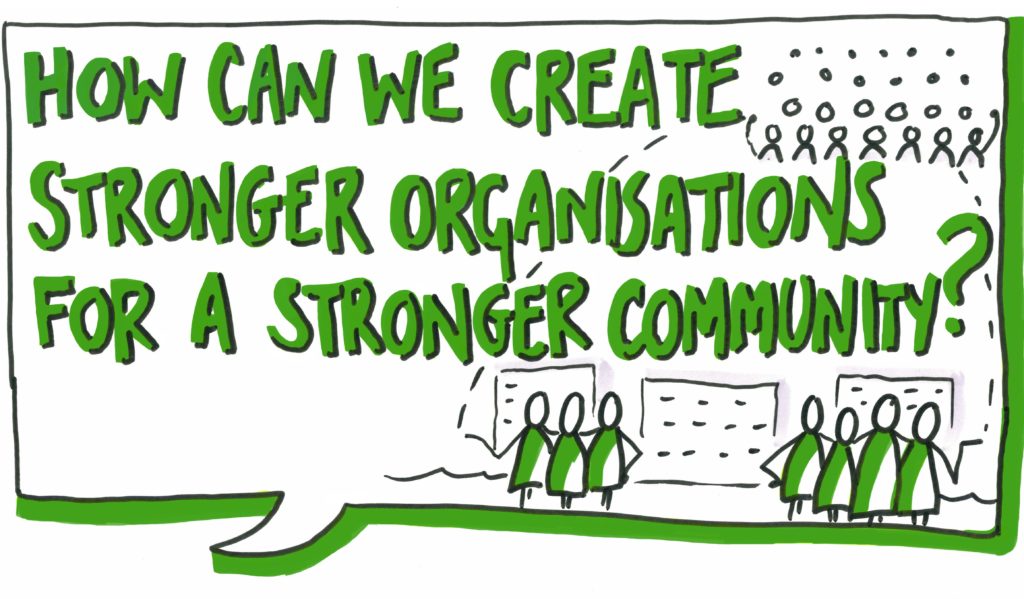
FRRR’s IRCF program is run in partnership with The Snow Foundation. Now in its second year, the five-year program is designed to strengthen local NFPs in the Shoalhaven through localised support, resources and funding so they can make lasting impacts in the community.
Called “Community Roadmap” (CR) workshops, these sessions will be the first in a series of workshops to develop the community roadmap and allow NFPs in the Ulladulla region to come together and map out how they will leverage the funding and support of the IRCF program over the next four years to maximise opportunities for long-term sustainability.
Kate Dezarnaulds, FRRR’s IRCF Program Coordinator, said that the workshops will look to the future, helping Ulladulla NFPs uncover shared goals and challenges, as well as offering a safe space for participants to reflect on and share the considerable challenges of the past year.
“The NFP community is incredibly diverse in the Ulladulla region and has done an amazing job in supporting and connecting their communities through the challenges of 2020. The workshops are a great opportunity for local NFPs to come together and celebrate their resilience, as well as support collaboration and sharing of resources,” Ms Dezarnaulds said.
“From the Community Roadmap workshops, the Ulladulla NFP community will have a list of priority projects that the IRCF program can then support over the next four years with grants and expert advice.
“The Community Roadmap is likely to uncover shared goals and needs such as strategic planning, governance training, digital marketing, finance advice and support, and additional resources to support innovation, sustainability and recovery.
“We are working with expert local facilitators, Campfire Coop, and invite a wide range of representatives from local NFPs in the Ulladulla region, including those not currently funded through the IRCF program, to come along to the workshops and have their say,” Ms Dezarnaulds said.
Ulladulla Community Roadmap workshops
| Who | Community-based not-for-profit organisations in Ulladulla, Milton, Mollymook, Lake Tabourie, Termeil, Conjola, Lake Conjola, Manyana and Bendalong villages |
| When | Session 1: Wednesday 17 March 9.30am-3.30pm (lunch provided); or Session 2: Thursday 18 March 6pm-9pm (light meal provided) |
| Where | Session 1: The Dunn Lewis Centre, 141 Vincent St, Ulladulla Session 2: The Grand Prix Lounge at Willinga Park, 132 Forster Drive, Bawley Point |
| How | To sign up for the workshop visit RSVP via the following links: Session 1: http://stks.be/ulladullacommunityroadmapworkshop-1daytimesession Session 2: http://stks.be/ulladullacommunityroadmapworkshop1evening |
For more information about the Investing in Rural Community Futures program in Ulladulla, Bateman’s Bay and Nowra visit – https://frrr.org.au/funding/people-grants/ircf-shoalhaven/.
The impact of investing in resilience
Hovells Creek Landcare (HCL), NSW received an FRRR grant to support a series of workshops to increase land management knowledge and strategies, at the same time as strengthening community and social connections and wellbeing.
When drought strikes, the toll of the dry land can have an overwhelming impact on a farmer’s livelihood, family and community.
The group has been running workshops on drought and land, and resource management with expert speakers, using a $19,554 Tackling Tough Times Together grant received in the thick of the drought.
These workshops provided Landcare members with the latest thinking and resources for drought management, as well as a social interaction opportunity. They aimed to support farmers and community members to feel that they are doing their best for their livestock, their landscape, their families and themselves – to plan for the future, as much as the present.
To assist with volunteer fatigue impacting the HCL during the demanding drought, the grant also helped to fund a Coordinator to manage the workshops. The Coordinator organised expert speakers, promoted the events and arranged the venues and catering. The grant also funded any expert guest fees and travel expenses.
Experts spoke on topics ranging from managing mental health, to soil and moisture monitoring, and livestock feeding strategies.
Around 50 to 70 people participated, including a mix of Landcare members and local landholders, but with sessions shared online and in newsletters and local media, the insights were shared widely. The participants varied in terms of their level of knowledge and understanding of climate change and its impacts. They all had differing community and individual pressures as a result of the ongoing drought, and were presented with a suite of options to help them respond.
According to one of the former committee members, the workshops had the following impacts on participants: an increase in wellbeing, knowledge and capacity – with much greater awareness of climate change scenarios and importantly the likely local impacts. They learnt about tools, technologies and improved land management practices to effectively, sustainably and productively manage natural resources and adapt to significant changes in climate.
As a result of FRRR’s support for the project, funded by the Stockland CARE Foundation, HCL was able to secure more funding for a soil moisture probe in the Valley to enable producers to access real time moisture levels, rainfall and soil temperature data. This probe will help with plant management and maximise growth opportunities both now and into the future.

